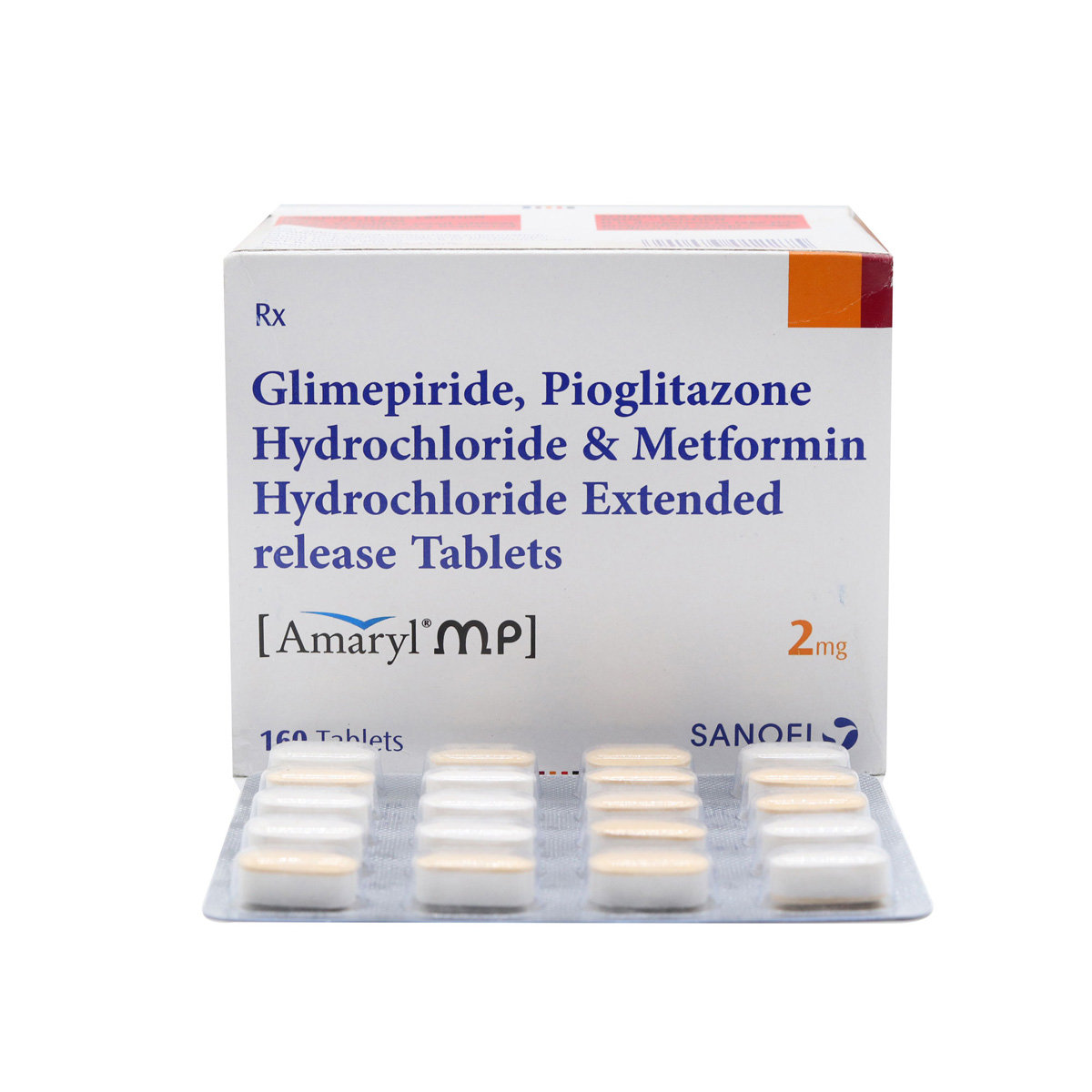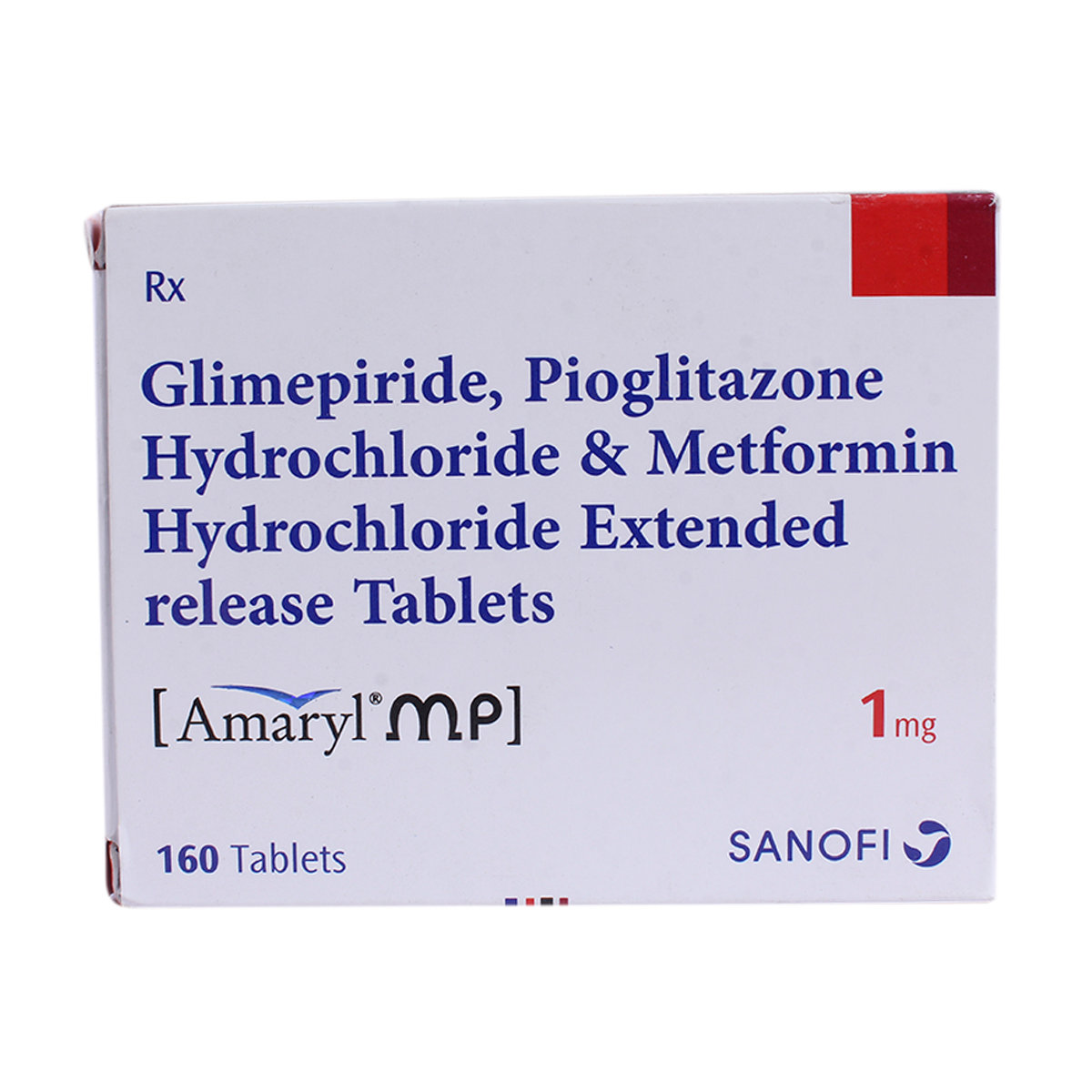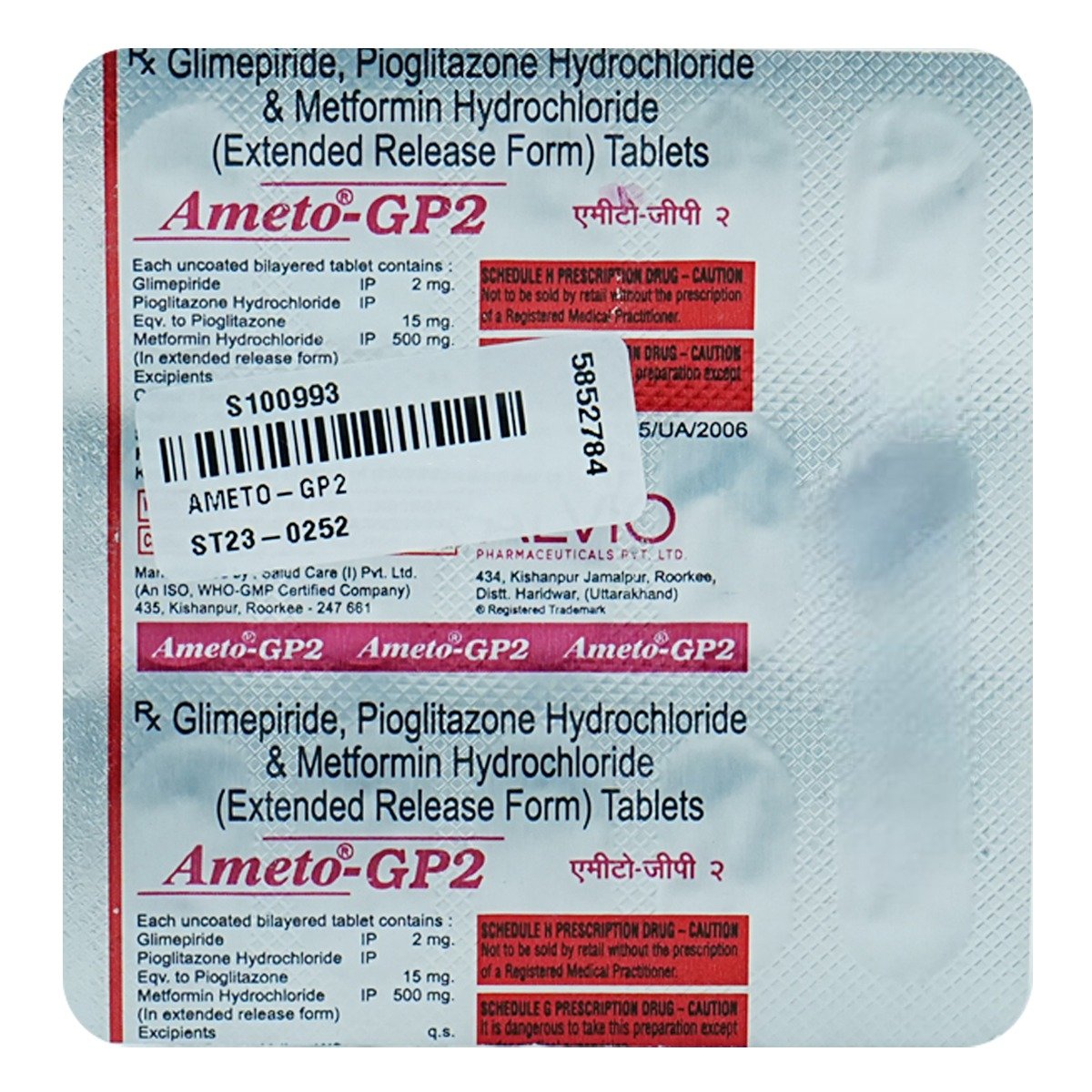Pioglitazone+metformin+glimepiride
About Pioglitazone+metformin+glimepiride
Glimepiride+metformin+pioglitazone belongs to the group of medications called ‘antidiabetic agents’ used in the treatment of Type 2 diabetes mellitus. Type 2 diabetes mellitus is a chronic or life-long condition in which blood sugar or glucose levels rise more than normal. It occurs when the body does not produce enough insulin (metabolizes glucose), or if produced, it cannot function properly in the body.
Glimepiride+metformin+pioglitazone is a combination of three medicines, namely: Metformin, Glimepiride, and Pioglitazone. Metformin acts by decreasing liver glucose production and intestinal glucose uptake. Glimepiride acts by increasing the amount of insulin released by the pancreas. Pioglitazone works by decreasing the amount of glucose released by the liver and also by improving the sensitivity of tissues towards insulin effects.
You should take this medicine as prescribed by your doctor. You may experience side-effects of such as nausea (feeling sick), vomiting (falling sick), diarrhea, headache, stomach ache, respiratory infection, weight gain, sweating, palpitations, and vision problems. Some patients experience decline in blood sugar levels lower than normal (hypoglycemia) resulting in sweating, dizziness, headache, confusion, feeling hungry, temporary changes in vision, uneasiness, irritability, and weakness. In such cases, seek medical attention immediately.
Do not take Glimepiride+metformin+pioglitazone if you are allergic to any of its contents. Do not use this medicine if you have heart failure, bladder cancer, or diabetic ketoacidosis (a complication of diabetes). Glimepiride+metformin+pioglitazone may cause ‘lactic acidosis’ (accumulation of lactic acid in the blood), which requires immediate medical attention. The risk increases if you are previously diagnosed with kidney or liver diseases. Do not consume alcohol (risk of lactic acidosis) or fast for prolonged periods (risk of hypoglycemia). Also, inform your doctor if you are pregnant, planning to become pregnant, or breastfeeding.
Uses of Pioglitazone+metformin+glimepiride
Medicinal Benefits
Glimepiride+metformin+pioglitazone contains Metformin, Glimepiride, and Pioglitazone. Glimepiride+metformin+pioglitazone is given when single or dual therapy of hypoglycemic agents is not effective in diabetes patients. Metformin acts by decreasing liver glucose production and intestinal glucose uptake. Glimepiride acts by increasing the secretion of insulin by the pancreas. Pioglitazone works by decreasing the amount of glucose released by the liver and improving insulin sensitivity in muscle and fat.
Directions for Use
Storage
Side Effects of Pioglitazone+metformin+glimepiride
- Nausea (feeling sick)
- Vomiting (falling sick)
- Diarrhea
- Headache
- Stomach ache
- Respiratory infection
- Weight gain
- Sweating
- Palpitations
- Numbness
- Vision problems
Drug Warnings
Glimepiride+metformin+pioglitazone should be used with caution in patients with heart diseases as it increases the risk of heart failure. Glimepiride+metformin+pioglitazone may cause ‘lactic acidosis’ (buildup of lactic acid in the blood), characterized by abdominal pain, muscle cramps, vomiting, severe fatigue, and difficulty breathing. It is a life-threatening condition that requires immediate medical attention. Inform your doctor if you have any severe liver or kidney problems as their normal functioning is required to eliminate excess lactic acid from the body. Do not consume excess alcohol as it increases the risk of lactic acidosis. Glimepiride+metformin+pioglitazone may lower vitamin B12 levels, so it is recommended to take blood tests regularly to identify any vitamin deficiencies.
Drug Interactions
Drug-Drug interactions: Glimepiride+metformin+pioglitazone may have an interaction with medicines used to treat bacterial infections (rifampicin, tetracycline, and clarithromycin), a medicine used to treat fungal infections (fluconazole), other oral antidiabetics, and medicines used to treat gout (probenecid).
Drug-Food interactions: Intake of excess alcohol may increase the chance of a life-threatening condition known as lactic acidosis.
Drug-Disease interactions: Glimepiride+metformin+pioglitazone should be avoided in patients with heart diseases (congestive heart failure and myocardial infarction), vitamin B12 deficiency, and alcoholism, type I diabetes, bladder cancer, edema (fluid retention), liver disease, premenopausal anovulation, obesity (weight gain), anemia should avoid intake of Glimepiride+metformin+pioglitazone.
Drug-Drug Interactions Checker List:
Safety Advice

Alcohol
cautionAlcohol may increase the risk of side-effects and worsen the condition.

Pregnancy
unsafeGlimepiride+metformin+pioglitazone is a category C drug and may cause harmful effects to the unborn baby. So, it is used only when the benefits of this medicine outweigh the risks.

Breast Feeding
unsafeGlimepiride+metformin+pioglitazone should not be used in breastfeeding mothers as it may get secreted in the breast milk and cause unwanted effects in the nursing babies.

Driving
cautionGlimepiride+metformin+pioglitazone may cause vision problems. So, do not drive or operate heavy machinery if you have any problems with your vision while using Glimepiride+metformin+pioglitazone.

Liver
cautionGlimepiride+metformin+pioglitazone should be taken with caution in patients with liver diseases. The dose may have to be adjusted by your doctor.

Kidney
cautionGlimepiride+metformin+pioglitazone should be taken with caution especially if you have a history of kidney diseases. The dose may have to be adjusted by your doctor.

Children
cautionGlimepiride+metformin+pioglitazone is not recommended for use in children below 18 years of age.
Habit Forming
Diet & Lifestyle Advise
- Fill your half plate with starchy veggies, a quarter with proteins, and a quarter with whole grain.
- Eat at regular intervals. Do not take the long gap between a meal or snack.
- Monitor your blood sugar level regularly especially when there are a lot of fluctuations.
- Invest at least 150 min of moderate-intensity physical activity and 15 minutes of high-intensity exercise every week.
- Lose weight gradually to achieve a healthy body mass index (18.5 to 24.9).
- Replace refined carbohydrates containing foods with whole grain foods and increase intake of fruits and veggies and other fiber-enriched foods.
- Reduce intake of saturated fat (or hidden fats) in food like chips, crisps, pastries, biscuits, and samosas. Choose omega 3 fatty acid-containing oils for daily cooking. For frying, you may use palm oil, mustard oil, groundnut oil, rice bran oil, and safflower oil.
- Do not take stress as it may elevate your blood sugar level. You may adopt stress management techniques like mindfulness, yoga, or meditation to control stress-related blood sugar changes.
- Opt for low-fat dairy products (low-fat yogurt, fat-free milk, and cheese, etc.).
- Keep your blood pressure as normal (120/80) as possible as it reduces the risk of heart diseases in diabetes patients.
Special Advise
- Glimepiride+metformin+pioglitazone shows optimum effects when you follow healthy lifestyle changes like weight loss, regular exercise, healthy diet, etc.
- Keep taking the drug even if you think your blood sugar levels are under control. If you miss a dose, do not take a larger dose, consult your treating physician for advice.
- Take short frequent meals, avoid prolonged fasting when taking this drug. Beware of symptoms of hypoglycemia which include sweating, dizziness, palpitations, shivering, intense thirst, dry mouth, dry skin, frequent urination, etc. Whenever you experience the above-mentioned symptoms, immediately consume 5-6 candies or 3 glucose biscuits or 3 teaspoons of honey/sugar and also get in touch with your physician. Make sure to carry these with you at all times, especially for long travels.
- Avoid drinking alcohol while on this drug as it increases the risk of hypoglycemia (decrease in blood sugar which might be fatal in some cases) and lactic acidosis (when the lactic acid increases in the body which impacts the functioning of various organs in the body).
- Try to quit smoking and reduce intake of carbohydrate-rich food like potato, rice, mangoes, bread, sugar, etc.
Patients Concern
Disease/Condition Glossary
Type 2 diabetes mellitus: It is a chronic condition in which blood glucose levels are elevated in the body. Insulin is responsible for the utilization of glucose by the cells. In type 2 diabetes, the body cells do not respond to insulin, or in later stages, your body may not produce enough insulin. Symptoms include excessive thirst, excessive hunger, fatigue, increased appetite, and dry mouth. This condition may worsen over time and cause toxic effects if not properly treated.
FAQs
Glimepiride+metformin+pioglitazone is a combination of three antidiabetic medicines, Metformin, Glimepiride, and Pioglitazone. It works by increasing insulin production, helping to restore your body's appropriate response to insulin, especially muscle and fatty tissues, thereby lowering your elevated blood sugar levels.
Patients with type 2 diabetes who have congestive heart failure, kidney problems, liver problems, vision problems, or diabetic ketoacidosis should not take Glimepiride+metformin+pioglitazone. It is also not given to pregnant, breastfeeding, or a premenopausal woman.
Hypoglycemia refers to low blood glucose levels. Glimepiride+metformin+pioglitazone may cause hypoglycemia. Hypoglycemia can occur if you miss or delay your food, drink alcohol, intense exercise, or take other antidiabetic medicine along with this medicine. So, take your medicine as advised by your doctor to avoid any unwanted effects of this medicine.
If you feel that your blood sugar levels are dropping, eat glucose tablets or chocolate immediately. This will help to increase your sugar levels instantly. So, it is always advised to carry glucose tablets or sugar candies with you.
Yes, type 2 diabetes may also occur in children. The risk increases if the child is overweight or obese.
You may experience high blood sugar, symptoms such as increased thirst and hunger, frequent urination, weight loss, delayed wound healing, and frequent infections. Consult a doctor or endocrinologist to confirm the diagnosis.








